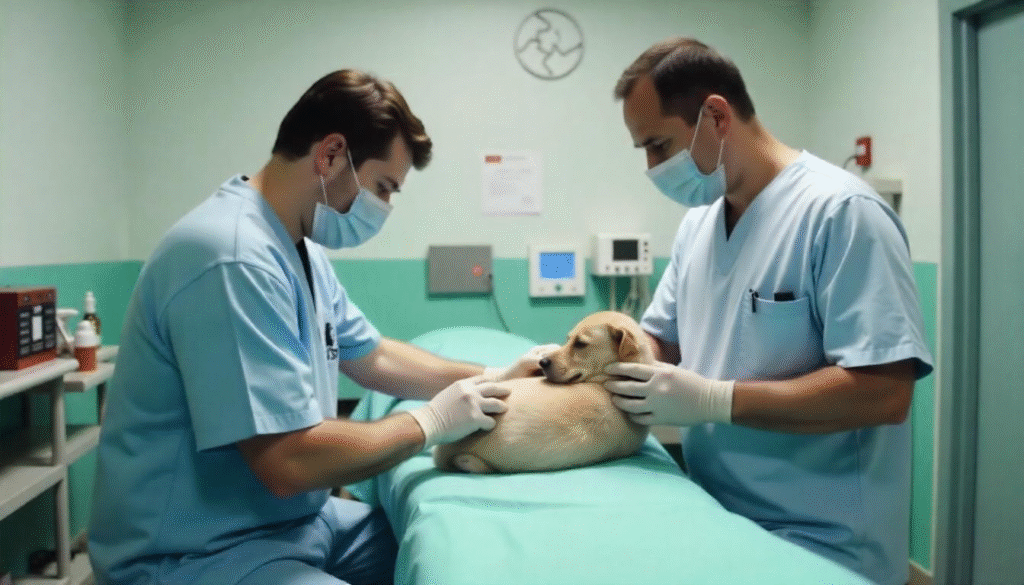
When your pet faces a sudden health crisis, knowing what to expect at an emergency animal hospital in Surrey can ease your stress and help you act quickly. These specialized facilities provide urgent care for pets experiencing life-threatening conditions, from accidents to sudden illnesses. This comprehensive guide explains the process, services, and tips for navigating an emergency vet visit, ensuring you’re prepared to support your furry friend.
Understanding Emergency Animal Hospitals
Emergency animal hospitals operate differently from regular veterinary clinics. They focus on critical care, often available 24/7 or during extended hours, to handle urgent situations. In Surrey, facilities like these are equipped with advanced tools, such as digital X-rays, in-house labs, and surgical suites, to diagnose and treat pets promptly. Common emergencies include trauma (e.g., hit by a car), poisoning, seizures, breathing difficulties, or severe vomiting/diarrhea.
Unlike routine vet visits, emergency hospitals prioritize cases based on severity, using a triage system. This means a pet with a life-threatening condition, like difficulty breathing, will be seen before one with a less urgent issue, such as a minor cut. Expect a fast-paced environment where staff work efficiently to stabilize and treat animals.
What Happens When You Arrive
- Check-In and Triage
Upon arrival, you’ll check in at the front desk. A staff member will ask about your pet’s symptoms and medical history. Be clear and concise—details like when symptoms started or any toxins your pet may have ingested are crucial. A veterinary technician will then assess your pet’s condition to determine urgency. In busy hospitals, wait times can vary, but critical cases are prioritized.
- Initial Examination
A veterinarian will perform a thorough exam, checking vital signs like heart rate, temperature, and breathing. They may recommend diagnostic tests, such as blood work, X-rays, or ultrasounds, to pinpoint the issue. These tests help create a treatment plan tailored to your pet’s needs.
- Treatment and Stabilization
Once diagnosed, treatment begins immediately. This could involve administering medications, fluids, or oxygen therapy to stabilize your pet. For severe cases, like fractures or internal injuries, emergency surgery may be needed. The vet will explain the recommended procedures and provide cost estimates upfront.
- Hospitalization or Discharge
Depending on the condition, your pet may need to stay for observation or intensive care. Hospitals have specialized areas where pets are monitored closely. If your pet can go home, you’ll receive detailed instructions for follow-up care, including medications and signs to watch for.
Emergency Veterinary Services Surrey
Surrey’s emergency animal hospitals offer a wide range of services to address urgent pet health issues. These include trauma care, toxicology (treating poisonings), seizure management, and surgical interventions like fracture repair or foreign object removal. Many facilities also provide overnight boarding and house calls for less urgent cases. With in-house diagnostics, vets can quickly identify problems, ensuring your pet gets timely treatment. Whether it’s a sudden illness or an accident, these services are designed to save lives and provide peace of mind for pet owners.
Costs and Payment Options vest in preparing for an emergency vet visit can reduce stress and ensure quality care. Here are practical tips to help you navigate the process:
- Know Where to Go
Locate the nearest emergency animal hospital in Surrey before a crisis occurs. Save their contact information and address in your phone. Popular options include facilities open 24/7 or with extended hours, like those offering after-hours care in Surrey.
- Pet Insurance
Emergency vet bills can be expensive, ranging from $200 to $2,000 or more, depending on the treatment. Pet insurance can help cover costs for diagnostics, surgery, or hospitalization. Review your policy to understand what’s included.
- Stay Calm
Your pet can sense your emotions. Staying calm helps you communicate clearly with the vet team and make informed decisions. Bring a friend or family member for support if possible.
- Bring Relevant Information
If your pet has a medical condition or is on medication, bring a list or the medication bottles. This helps the vet avoid harmful drug interactions and tailor treatment.
- Ask Questions
Don’t hesitate to ask about the diagnosis, treatment options, and costs. A good emergency hospital will explain everything in simple terms and discuss affordable alternatives if needed.
How to Choose the Right Emergency Animal Hospital
When selecting an emergency vet in Surrey, consider these factors:
- Accreditation: Look for hospitals accredited by organizations like the Veterinary Emergency and Critical Care Society (VECCS) for high standards.
- Staff Expertise: Ensure the hospital has experienced veterinarians and trained technicians skilled in emergency care.
- Facility Equipment: Advanced tools like digital X-rays, ultrasound, and in-house labs ensure faster, more accurate diagnoses.
- Communication: Choose a hospital that communicates clearly and keeps you updated on your pet’s condition.
- Location and Hours: Opt for a conveniently located facility with 24/7 or extended hours to avoid delays.
What to Expect After the Visit
After emergency treatment, your pet may need follow-up care with your regular veterinarian or a specialist. The emergency hospital will provide a detailed report of the diagnosis, treatments, and medications given. Follow their instructions carefully, and schedule a follow-up visit to ensure your pet’s recovery. Watch for signs of complications, such as lethargy, vomiting, or changes in appetite, and contact a vet if they occur.
Why Emergency Care Matters
Pets can’t tell us when they’re in pain, so recognizing emergencies is critical. Delaying treatment for conditions like poisoning, trauma, or breathing issues can worsen outcomes. Emergency animal hospitals in Surrey are designed to act fast, offering life-saving care when every second counts. By understanding the process and preparing ahead, you can ensure your pet gets the best possible treatment.
FAQs About Emergency Animal Hospitals in Surrey
Q: What qualifies as a pet emergency?
A: Emergencies include difficulty breathing, severe bleeding, seizures, poisoning, trauma (e.g., hit by a car), or inability to urinate/defecate. If unsure, call the hospital for advice.
Q: How much does an emergency vet visit cost?
A: Costs vary, typically $200–$2,000, depending on diagnostics, treatment, or surgery. Pet insurance can help offset expenses.
Q: Can I visit my pet during hospitalization?
A: Policies vary. Some hospitals allow visits, while others restrict access to reduce stress on pets. Call to confirm.
Q: What if I can’t afford emergency care?
A: Ask about payment plans, low-cost options, or charities like the BC SPCA that may assist with costs.
Q: Are all emergency hospitals open 24/7?
A: Not all, but many in Surrey offer 24/7 or extended hours. Check hours before an emergency.

